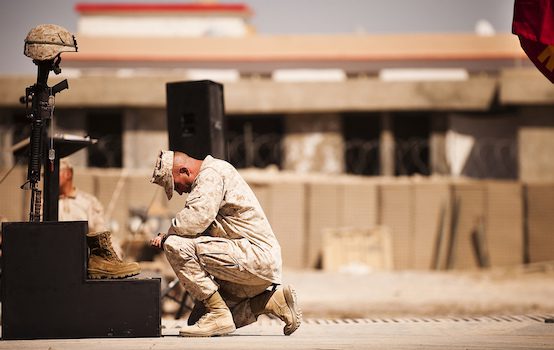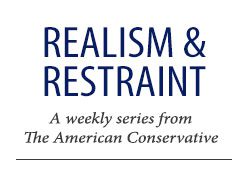Will Our Longest War End With a Whimper and a Hush?

When this Baby Boomer thinks about the Afghanistan War, he can’t help but compare it to the Vietnam War. In both conflicts, American involvement began with high hopes, and some modicum of justification. Yet both eventually became frustrating and costly quagmires, from which the American people wanted out.
And while the effort to settle the Afghan war with diplomacy is still a work in progress—the Trump administration’s deal was just announced on February 29—it seems clear that as with Vietnam, the main goal is to provide the U.S. with a fig leaf for an exit, leaving the locals to their fate, as opposed to entertaining any serious thought that the fighting will be counted as a success for America.
In other words, Uncle Sam seems destined to lose this war, just as we lost in Vietnam.
Yet what’s striking to this Boomer is how little attention the Afghanistan story is getting. When the Paris Peace Accords were signed in January 1973, that was big news; it was, in fact, front-page news for weeks (referring to a once-prevalent form of information delivery, the hard-copy newspaper).
Two years later, in April 1975, when our ally South Vietnam fell to the North Vietnamese communists, that was big news, too. In fact, the three broadcast TV networks, each one watched by tens of millions of Americans (broadcast being another artifact of the media in a bygone era), carried the news live for days on end.
By contrast, with Afghanistan, the news coverage has been perfunctory, overshadowed by the coronavirus and the Democratic primaries. The political reaction, too, has been muted. One might have thought that 19 years of fighting would have encouraged more politicians to engage—pro or con—but few have done so.
We might first look to the Democratic presidential candidates, who are, of course, eager to critique the incumbent president on just about everything.
Yet Joe Biden, to name one, seems to have said nothing about Afghanistan. His Twitter feed has been focused on his South Carolina victory and other aspects of his campaign—although he did pause on March 1 to tweet: “I’ve never been more optimistic about America’s future than I am today. If we come together and unite this country, there’s not a single thing we can’t accomplish.” Whatever one thinks of Biden, it’s evident he’s not taking time, at least not now, to reflect on two decades of war.
Meanwhile, on the Biden campaign’s foreign policy page, we see only this about the fighting: “End Forever Wars: Biden will end the forever wars in Afghanistan and the Middle East, which have cost us untold blood and treasure.” In other words, Biden isn’t about to make Afghanistan any sort of issue—because on this much, at least, he agrees with Trump, down to the disdainful “forever wars” formulation.
Interestingly, another Democratic hopeful, Senator Elizabeth Warren, uses much the same language. Her page pledges to “fix our foreign policy and end our endless wars.”
As for Senator Bernie Sanders, he called for withdrawing from Afghanistan way back in 2011, and today his campaign website pledges to “end these interventions and bring our troops home.” For his part, Mike Bloomberg, the mostly unreconstructed neoconservative, doesn’t even mention Afghanistan; his foreign policy focus, such as it might be, is mostly consumed with climate change. Indeed, all the Democrats still running seem more interested in climate than in Kabul; the single exception is Representative Tulsi Gabbard—and sadly, she’s effectively out of the race (at least as a possible Democratic nominee).
Interestingly, one soldier who fought in Afghanistan—and who was awarded a Bronze Star and a Purple Heart for his valor and sacrifice—is Max Rose, now a Democratic congressman from New York City. Earlier this week on MSNBC, Rose praised Trump from the other side of the aisle, saying, “This decision by the administration is 100 percent correct.”
To be sure, a few voices in national politics are attacking the deal. One of them, of course, is Representative Liz Cheney, daughter of Dick and American Enterprise Institute soulmate. Yet even her single bleat of a tweet was hardly a barn-burner: “Today’s agreement with the Taliban includes concessions that could threaten the security of the United States.”
Meanwhile, Politico served up the view of the military deep state under the headline, “Cracks start to show in Taliban peace deal.” We might interpret this story, bearing news about outbreaks of violence, as speaking to the natural belligerence of the Taliban, as well as to the reluctance of the Pentagon, which doesn’t wish to walk away from turf, both geographic and budgetary. In the meantime, the globalists at The Washington Post don’t like the deal, a view shared by the Afghan government, which wants the U.S. military to stay forever.
Soon, more globalists and neocons will be speaking out against the deal, even if it means diverting themselves from their usual Never Trumpery.
Yet it remains notable that potentially critical voices in the debate have said little or nothing. One such is Senator James Risch, chairman of the Senate Foreign Relations Committee. In recent days, Risch has been vocal on such matters as energy, the service academies, and the Columbia River, but as to Afghanistan, he’s been as quiet as an Idaho beaver in hibernation.
Thus Risch stands in contrast to the chairman of the Senate Foreign Relations Committee during the Vietnam era, Senator William Fulbright. Back in 1966, Fulbright convened hearings on the war, stacked them with critics—and sagely presided as the hearings supernova-ed in the news.
The old broadcast networks, making clear their own view of the war, chose to cover some of the hearings live, and so Fulbright became a household name. Indeed, his freely applied signature phrase of scorn for the Johnson administration, “the arrogance of power,” became the title for his must-read book in 1967, helping to define the entire Vietnam era—and turn public opinion from hawkish to dovish.
Yet half a century later, in regard to Afghanistan, we are hearing, one might say, the sound of silence. Boomers know that those words formed the title of a number one hit song by Simon & Garfunkel, released in 1965, and heard all through the decade (and ever since).
The lyrics are mostly a commentary on the gap between noisy mass society—“people talking without speaking, people hearing without listening”—and quiet individual truth. Yet one can also take the lyrics as a meditation on the paradox of loudness yielding up nothingness. And yes, there’s a melancholy nothingness to all the spin and propaganda of the past two decades of the war, which will be remembered as having been simply dispatched into a void. And, oh yes, too, the blood, the sweat, and the tears—gone to gray havens, where the silence echoes loudly.
Today, as ever, if there’s value to be gained in growing old, it’s in the gaining of perspective. Mercifully, the American effort in Afghanistan was never anywhere near as massive as the effort in Vietnam, and the casualty figures show it: more than 58,000 killed in Vietnam, fewer than 2,500 killed in Afghanistan. So Afghanistan will be remembered as a “small war.”
Of course, Afghanistan wasn’t small to the men and women who fought there. Indeed, it was everything to those who gave their last full measure of devotion.
So that’s the verdict on Afghanistan, where the U.S. showed, as in Vietnam, that it had more arrogance than power.